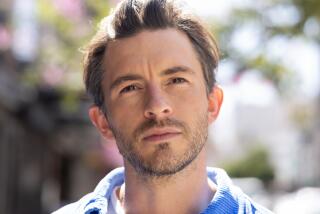BOOK REVIEW : Bad-Boy Tale Hardly Works : HELLO DARLING, ARE YOU WORKING? <i> by Rupert Everett,</i> Morrow, $20; 240 pages
- Share via
When “Hello Darling, Are You Working?,” by British actor Rupert Everett, was published in England earlier this year, the Times Literary Supplement called the novel “deplorable.”
That reaction was easy to predict (though it didn’t prevent the book’s becoming a bestseller): “Hello Darling” would have had to be absolutely first-rate for the stuffy TLS to overlook the fact that the story concerns a homosexual actor-cum-prostitute who rather enjoys his work . . . especially the rich, drug-enhanced, party-going lifestyle that comes with it.
Everett’s U.S. publisher has shrewdly quoted the key word from the TLS review on the back cover of “Hello Darling,” calculating that condemnation by the cultural elite--one thing you can say for Dan Quayle, he’s given us a new buzz phrase--could only help a book brimming with bad-boy attitude.
Inconveniently for the publisher, however, the TLS’ analysis is essentially correct, but not because of the novel’s content. Although the writing in “Hello Darling,” word for word, is perfectly adequate, Everett (who has appeared in “Another Country,” “Dance With a Stranger” and other films) hasn’t bothered to give the novel sense, let alone shape.
From the commercial point of view, of course, sense and shape is unnecessary in a novel like this, for as the publisher notes in its promotional material, the story of “Hello Darling” is “pulled from (Everett’s) own life experiences.” Comparisons will no doubt be made to “Bright Lights, Big City” and “Less Than Zero,” those earlier chronicles of drug-happy, party-loving subcultures, but they’re inapt because “Hello Darling” (to Everett’s credit, perhaps) has no literary pretensions whatsoever.
The book starts well enough, with the reader learning by the end of the second page that Everett’s hero, Rhys Waveral, had two significant childhood dreams: to become a Great Actress, and to receive a wedding dress for Christmas. This is a child, clearly, who knows what he wants, but his wants don’t exactly jibe with those of his parents, a retired brigadier general and an impetuous socialite.
By the age of 15 Rhys has discovered that he can make good walking-around money by picking up tricks in subway stations, having inherited from his father--as Everett puts it rather nicely--a “hunting instinct,” though his happens to work in a corner of the jungle the brigadier wouldn’t go near.
Although Rhys is never able to fulfill his dream of becoming a great actress, he does the next best thing by landing, quite fortuitously, the lead role on an American soap opera.
“Our Butler” is an instant hit, and Rhys soon becomes an international star appearing, improbably, on the cover of Time and on “The Tonight Show.” (Everett refers to the program, wrongly of course, as “The Johnny Carson Show,” and his version of Carson’s introduction of Rhys is not the least convincing.) Rhys’ salad days prove short, however, but not short enough. By the time “Our Butler” is canceled, he has become addicted to the high life.
He moves to a very expensive suite in Paris, befriends a beautiful Eurasian courtesan named Peach, and abides quite happily until the stock market crash of 1987 leaves him with very little besides a fabulously large hotel bill. Rhys returns, naturally, to prostitution, agreeing to accompany one Rikki Lancaster, a wealthy, be-turbaned widow, to a costume party in Morocco for the sum of $100,000.
We learn all this by Page 50, and thereafter it’s a long downhill ride. “Hello Darling” is full of eccentric characters, from Rhys and Peach and Rikki on down, but most of them are bit players elevated to supporting roles they don’t merit.
There’s much to-ing and fro-ing between Paris, London, and Tangiers, as Rhys’s parents attempt to track him down, but the relationships among Rhys’s family, as well as those among Rhys’s friends, are hopelessly static, limited to one-line jokes and mutual misunderstandings. Rhys makes reference to friends dying of AIDS and cancer, but such attempts at seriousness seem out of place in the flip unreality that dominates “Hello Darling.”
Everett suggests at the end of the book that Rhys’ story will be continued--a distinct possibility, given that “Hello Darling” was a bestseller in England. Before committing Rhys to more adventures, however, Everett would do well to read a few good novels and try to figure out their inner workings. On second thought, maybe he should just hire an in-home personal novelist to produce “Hello Darling, It’s Me Again!” . . . hmmmm . . . Is there such a thing as Method Writing?
More to Read
Sign up for our Book Club newsletter
Get the latest news, events and more from the Los Angeles Times Book Club, and help us get L.A. reading and talking.
You may occasionally receive promotional content from the Los Angeles Times.










